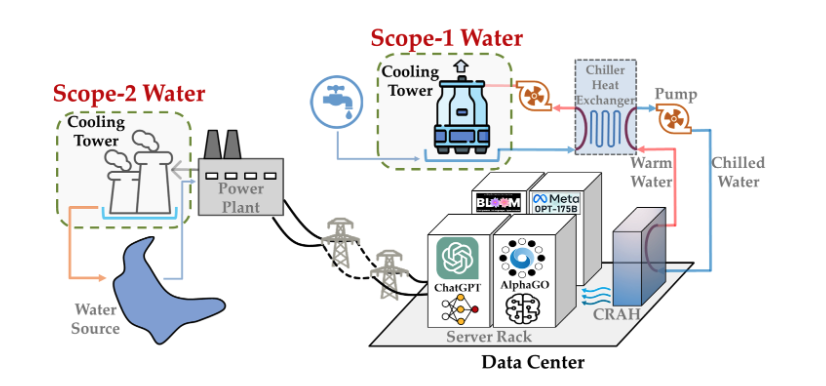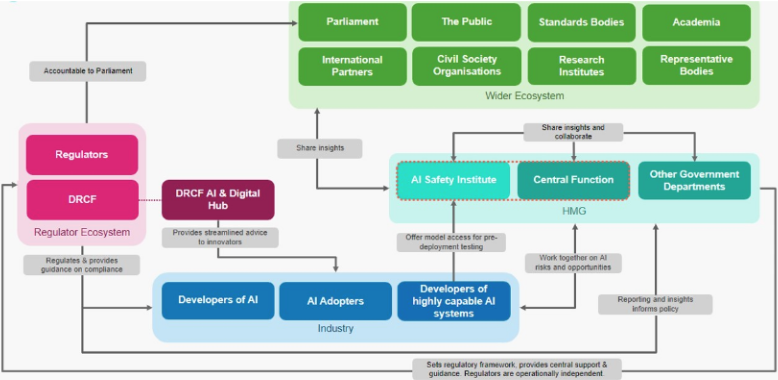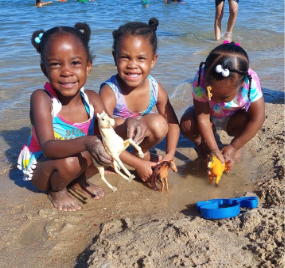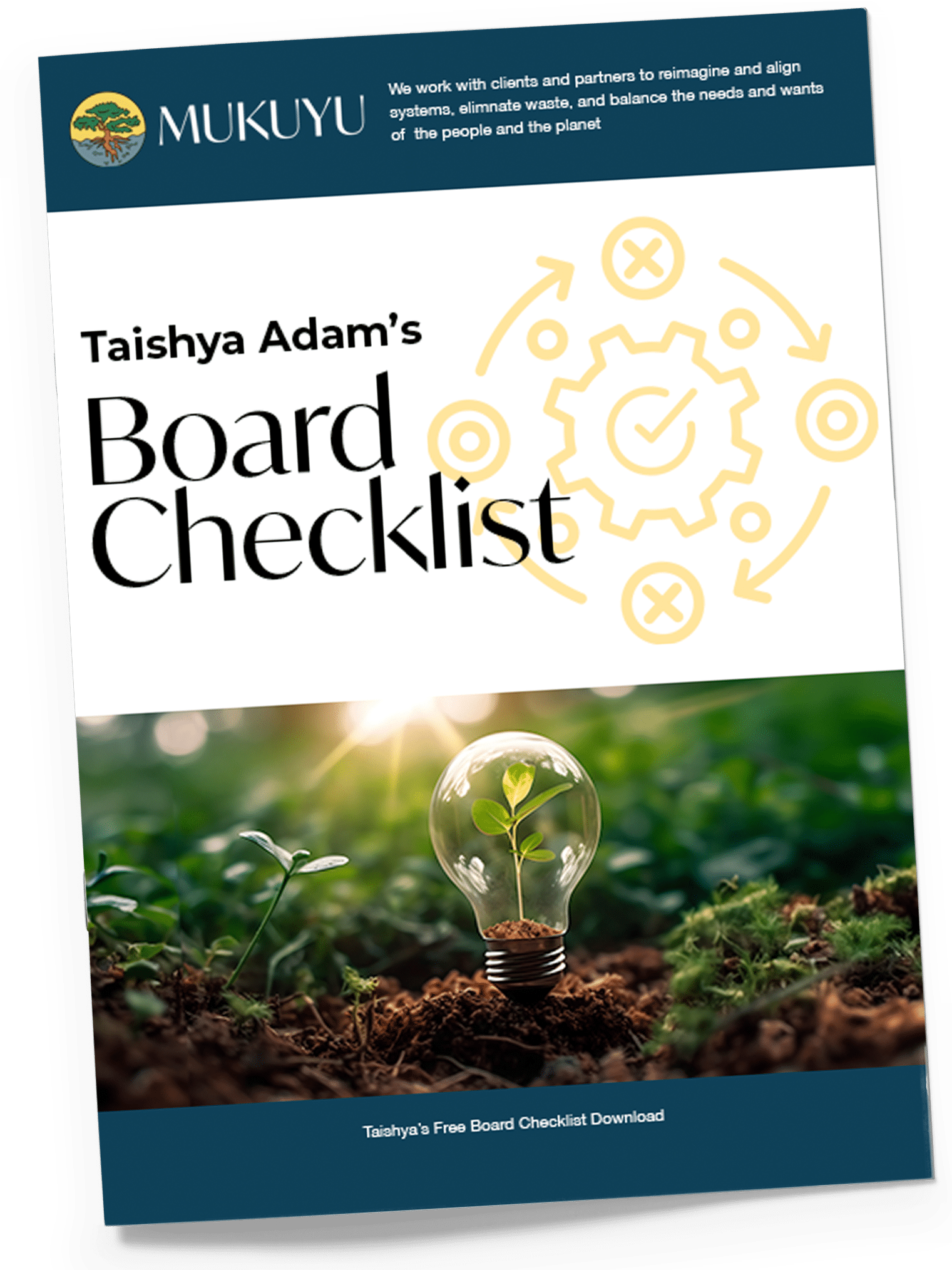Happy Ocean Month 2024!

Image: Taishya Adams, founder & CEO, Mukuyu Collective, LLC playing on the beach as a kiddo.
Let’s continue our dive into an ocean of stories that bring together people from every place on the planet. This water blog series blog focuses on reconnecting with our intergenerational root systems, reclaiming our heritage and histories, and riding the amazing waves of water’s legacy to discover important lessons in resilience and empowerment.
Today, we will continue our water series with a plunge into water’s function as both a source of joy and despair. I’ll share with you stories of cultural resilience, aquatic heritage restoration, and the development of inclusive outdoor communities. This blog focuses on the role that water plays in our lives by focusing on three areas: working waters, toxic waters, and healing waters. Together, let us learn, unlearn, and relearn to get back into alignment with the natural world as a natural being.
Missed the first blog in the series? We got you! Click here to access.
Working Waters
Farming, energy generation, and artificial intelligence (AI) all have one thing in common. Water. People from every walk of life are now experiencing what AI means for their lives. For some it means math, writing, and research become easier, while for others it means giving up life sustaining water for a machine.
A recent study conducted in collaboration between the University of California, Riverside and the University of Texas, found that ChatGPT would require 500 ml of water, or a standard 16.9 oz water bottle, for every 20 to 50 questions answered. That’s quite a bit of water. How many questions do you ask per day? Could generative AI be ‘drinking’ more water than you? It is easy to use resources when we don’t see where they come from and feel disconnected. As clean water becomes more scarce worldwide, conserving water is life saving.

Source: https://oecd.ai/en/wonk/how-much-water-does-ai-consume
Responsible AI techniques have become an urgent factor in a world concerned about global water shortages. Timnit Gebru, a well-known Black AI scientist, and founder of the Distributed Artificial Intelligence Research Institute (DAIR) writes that creating a sustainable future will not be possible without creating AI that also operates sustainably.
DAIR is a vital organization that is generously supported by organizations. Its purpose is to address the societal consequences of artificial intelligence (AI), with an emphasis on influencing AI policies, increasing transparency, and eliminating bias, particularly in facial recognition software that has traditionally been prejudicial to Black, Indigenous, and People of Color (BIPOC) populations. In addition to the ethical issues facing AI, many are working to reduce the use of water in generative AI.
The United Kingdom Government has adopted a cross-sector, non-statutory, outcome-based framework for regulating AI inclusive of safety, security, and transparency. These are safety, security and robustness, appropriate transparency and explainability, fairness, accountability and governance, and contestability and redress.

Source: https://www.gov.uk/government/consultations/ai-regulation-a-pro-innovation-approach-policy-proposals/outcome/a-pro-innovation-approach-to-ai-regulation-government-response
Developing inclusive and sustainable AI policy frameworks should be a top priority for software and hardware engineers world wide. AI seems to be here to stay. Our team continues to ponder the following questions:
If AI is here to stay, how can users and developers conserve water throughout the generative AI lifecycle? How can AI infrastructure be made with water conservation in mind?
Toxic Waters
Toxic pollution threatens lakes, rivers, and oceans. Algae blooms infest Colorado’s reservoirs—Barr Lake, Cherry Creek, Road Canyon, Deweese—extending to the Great Pacific Garbage Patch, now the size of Texas, killing marine life and our food chain.

Source: Windsor Lake, Colorado Parks and Wildlife (2019)
My oceanic engagement via roles on the Board of Black and Marine Science renders me acutely aware of these problems. Life-sustaining oxygen in the air we breathe originates from ocean plankton. Since breathing is a necessity of life, so is taking care of our oceans.
It is easy to point the finger at other people or big corporations but remember, the finger you point at another is three back at ourselves. As an outdoor recreationalist who love to fly fish, hike, and ski, I am now acutely aware of the outdoor recreation and forever chemical connection. “Forever chemicals” lurk in most drinking supplies, endangering mental and physical well-being. Pollution-driven algae blooms threaten humans and animals, necessitating immediate action, medical attention, and vigilance. What does that have to do with outdoor recreation?
Think of all of the plastic products used in outdoor activities. Tents, jackets, rain boots, fishing bait. Many of these products are made of materials that release dangerous toxins into waterways. I have a lot of outdoor recreation gear that uses these forever chemicals. Luckily, there are outdoor companies that are cognizant of this in their product design. To decrease the impact of your outdoor recreation on Mama Earth, try buying from brands like these.
In addition, initiatives such as Plastic Free Waters and 4Ocean, confront this monumental challenge. Their combined endeavors, bolstered by global awareness, alter the course of our future and create pathways for 7 generations to thrive.
Healing Waters
My interest in healing waters began early in life. I remember taking baths as a kiddo and cherishing to time to play, laugh, and cleanse. As an adult, I was reintroduced to the healing warm waters communally and now have a strong hot springs practice.. These sacred waters, warm and pleasant like waterfalls, are revered in many cultures as both rejuvenators and bestowers of benefits. Healing waters transcend physical national boundaries. In my experience healing waters connect us with purpose.
Evidence suggests that natural spaces, especially urban green spaces and waterscapes (water and riparian areas), can lower exposure to air pollution, extreme heat, and noise, increase opportunities for physical activity and social engagement, and decrease stress and depression by contacting with nature. These results align with indigenous and ancestral wisdom.
It has been a dream to reconnect marginalized communities to nature rich experiences throughout my life. Starting with the Children’s Defense Fund Freedom Schools in the 1990s to serving as a Commissioner for Colorado Parks and Wildlife. I once hosted an annual Aquatic Afros Day where we used paddle boards and canoes as well as fishing to reconnect to our ancestral heritage.

Source: Young participates at the annual Vibe Tribe Adventures Beach Party 2023
I am grateful to continue to craft pathways to those healing waters for youth and their families around the world. The Mukuyu Collective continues to be a core member of the Outdoor FUTURES Initiative which seeks to build momentum for the creation of a national equity or opportunity fund that will ensure long-term investments in programs to serve all youth with opportunities to explore the great outdoors. We are eager to connect with those who provide meaningful nature based experiences. Please email me at taishya@mukuyucollective.com if you are interested in learning more and getting involved!
Colorado is lucky to have an Outdoor Equity Fund. The Outdoor Equity Grant Program (OEGP) was established in June 2021 through the passage of HB21- 1318 to support youth up to age 25 from underrepresented communities and their families to participate in equitable opportunities to experience Colorado’s parks and open spaces, to participate in outdoor recreation and to engage in conservation activities, career exploration, and outdoor job training. The traditionally excluded communities served by this program include: Black, Indigenous, and people of color; LGBTQ+; people with disabilities; and low-income. The OEGP is funded through Colorado Lottery proceeds. Each year, the fund receives more applications than they have funds to cover in spite of an annual increase in the fund itself thus calling for diverse funding streams to support long term sustainability.
The Wave Ahead
As we face the climate crisis, it is essential to reclaim the interconnectedness between water in our bodies, lives, and planet. Acknowledging the ways our human behavior can impact water negatively or positively. use and impact waterways (e.g. forever chemicals), let us remember
At the end of the day, humans are 6-8 gallons of water. The sooner we re-integrate as humans reintegrate into the natural world not as the dominant species but as an interconnected steward. We have seen what happens when we center human needs over other parts of our ecosystem which has resulted in unprecedented heat, drought, floods, and pollution. We, as water, have the potential to nourish or hurt, to produce or to destroy. Understanding water leads to a better understanding of ourselves. Let us choose the path that allows 7 generations to thrive.

